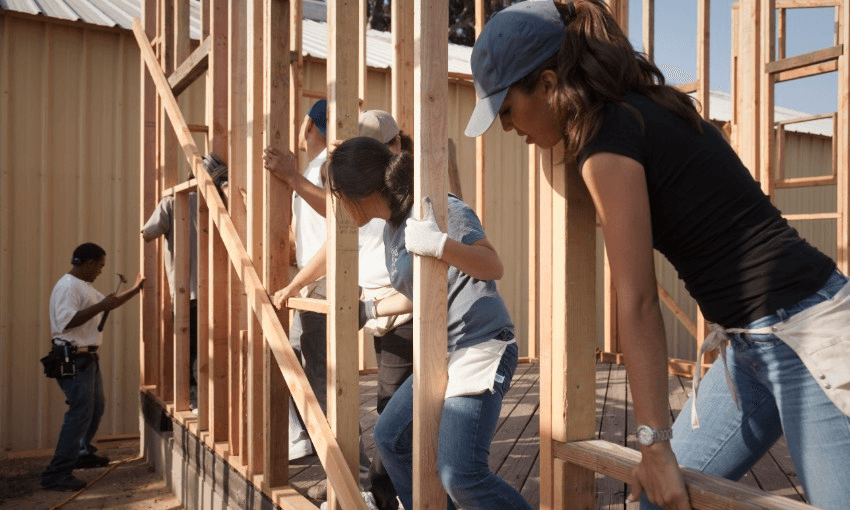Roughly 11,000 people lost their jobs from Covid-19, and 10,000 of them were women. But as Leonie Morris from Auckland’s Womens Centre writes, this shows the need to address industrial patriarchy and create opportunities for women where they’re needed most.
Just as predicted, Covid-19 has affected unemployment and under-employment rates for women far more than for men.
Along with others, Auckland Women’s Centre noted early on that, unlike other recessions, this one was likely to impact industries in which large numbers of women were employed such as hospitality and tourism. Yesterday’s Stats NZ figures confirmed this was the case, and although the data didn’t include employment data by ethnicity, traditional employment patterns and long-standing discrimination would lead us to expect that the employment of wāhine Māori and women in marginalised communities were hardest hit.
It’s not acceptable to allow women to bear the brunt of the recession. Wāhine Māori and women of colour should no longer be used as “shock absorbers” for the economy. But this is our default setting and it gets entrenched in our thinking when Treasury directly refuses to analyse the effects of government policy on women. This is the white patriarchy at work, folks.
Encouraging women in male-dominated sectors will only go so far. It didn’t work after the Christchurch earthquakes, mostly, we hear, due to the sexism of the industries involved. Whether in crisis or not, construction and manufacturing industries need to shed their patriarchal ethos. But this huge culture change won’t take place overnight.
So let’s get more creative and pirouette in a different direction. A follow-up pandemic response package needs to protect all women, and prioritise community and all contributions to collective, long-term well being (including looking after Papatūānuku). This would not only be better for women’s paid employment, but it would also be better for women overall – better for everyone and better for the land, sea and air.
Why not use the opportunity to address the critical shortage of mental health workers? The money is there, but the people aren’t. We’ve seen a vague mention of apprenticeships in mental health, presumably to meet ambitious targets for things like peer support and talk therapies. This sounds potentially marvellous, so let’s see some details and action. Even if training takes two-to-three years, let’s immediately start offering more people opportunities in a caring and potentially woman-friendly industry. Let’s scale this up. And let’s ensure that kaupapa Māori and culturally appropriate services are the key goal and destination of workforce increases.
Let’s acknowledge the shortage of jobs in a humanitarian way by lifting all work and work preparedness burdens from the many sole female parents receiving benefits, at least for the next year. In a time of rapidly rising unemployment, parents should not be obliged to turn from their key responsibility of caring in order to apply for jobs that don’t exist. This is an additional source of stress and anxiety and sets people up to fail. Those that do have the capability and desire to work should be supported to do so (with training, for example), but sole parents shouldn’t feel pressured.
Currently, MSD describes Sole Parent Support (SPS) as “a weekly payment that helps single parents find part-time work or get ready for future work.” We believe this is an inappropriate aim, and that it should be a payment that supports single caregivers in order to care for their children.
Where possible, both the government and private employers should be encouraged to offer job vacancies as possible full-time, part-time or job-share arrangements. This helps to ensure people have the option of prioritising caring responsibilities more highly and share them across genders.
We should be offering women-to-women support and ways to build confidence, such as through short courses, networking, mentoring and website support for women who are creating start-ups or otherwise involved in entrepreneurial activity. Women traditionally aren’t encouraged to take entrepreneurial risks or go into business for themselves. Having a women-only entrepreneurial support programme might make this easier. Women were in charge of half of New Zealand businesses employing fewer than 20 people but were more likely to be based at home, earning less than those in charge by men, and be working part-time.
Let’s implement a government procurement strategy that incorporates social goals and equity for women, especially wāhine Māori and women of colour.
Let’s support community-based, not-for-profit, job-creating initiatives with social goals for women. The Wise Collective – which supports women with refugee backgrounds to develop the necessary knowledge, skills, confidence and resources to start up or contribute to activities that generate income for their families – is an excellent example of job creation which meets social goals.
The ideas are out there, and they can be put into action immediately. We just need to look beyond the shovels to the carers, the planners and of course, the visionaries.
